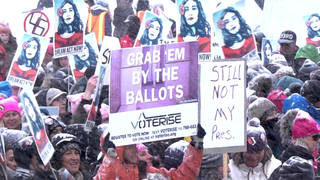
In one of the largest days of protest in U.S. history, millions took to the streets Saturday one day after the inauguration of Donald Trump. The largest protest was the Women’s March on Washington, where more than 500,000 packed the streets. According to crowd scientists at Manchester Metropolitan University in Britain, the crowd was roughly three times the size of the audience at President Trump’s inauguration a day earlier. Women-led marches took place in over 600 locations spread across seven continents—including Antarctica. In addition to Washington, massive protests took place in Boston; Chicago; Denver; Los Angeles; Madison, Wisconsin; New York; Oakland; Portland, Oregon; St. Paul; San Francisco and Seattle. According to one count, as many as 4.6 million people took part in the global day of action.
Transcript
AMY GOODMAN: In one of the largest days of protest in U.S. history, millions took to the streets Saturday, one day after the inauguration of Donald Trump. The largest protest was the Women’s March on Washington, where it’s believed more than 500,000 people packed the streets. According to crowd scientists at Manchester Metropolitan University in Britain, the crowd was roughly three times the size of the audience at Donald Trump’s inauguration a day earlier. Women-led marches took place in over 600 locations spread across seven continents, including Antarctica. In addition to Washington, D.C., massive protests took place in Boston; Chicago; Denver; Los Angeles; Madison, Wisconsin; New York; Oakland; Portland, Oregon; St. Paul; San Francisco; Montpelier, Vermont; and Seattle. According to one count, as many as 4.6 million people took part in the global day of action. We begin today’s show with highlights from the speeches at the Women’s March on Washington.
AMERICA FERRERA: My name is America Ferrera. And I am deeply honored to march with you today as the chair of the artists’ table, as a woman and as a proud first-generation American born to Honduran immigrants.
It’s been a heart-rending time to be both a woman and an immigrant this country. Our dignity, our character, our rights have all been under attack, and a platform of hate and division assumed power yesterday. But the president is not America. His Cabinet is not America. Congress is not America. We are America! And we are here to stay!
We march today for our families and our neighbors, for our future, for the causes we claim and for the causes that claim us. We march today for the moral core of this nation, against which our new president is waging a war. He would like us to forget the words “Give me your tired, your poor, your huddled masses yearning to be free,” and instead take up a credo of hate, fear and suspicion of one another. But we are gathered here and across the country and around the world today to say, Mr. Trump, we refuse. We reject the dehumanization of our Muslim mothers and sisters. We demand an end to the systemic murder and incarceration of our black brothers and sisters. We will not give up our right to safe and legal abortions. We will not ask our LGBTQ families to go backwards. We will not go from being a nation of immigrants to a nation of ignorance. We won’t build walls, and we won’t see the worst in each other. And we will not turn our backs on the more than 750,000 young immigrants in this country currently protected by DACA.
AMY GOODMAN: That’s actress and activist America Ferrera at the Women’s March on Washington. We’ll turn to more highlights from the march, including Angela Davis, Gloria Steinem, Alicia Keys and Madonna, in a minute.
[break]
AMY GOODMAN: That’s the song “Quiet,” performed by MILCK and the #ICANTKEEPQUIET Choir of Washington, D.C. This is Democracy Now!, democracynow.org, The War and Peace Report. They performed at the march and around Washington, D.C.











Media Options